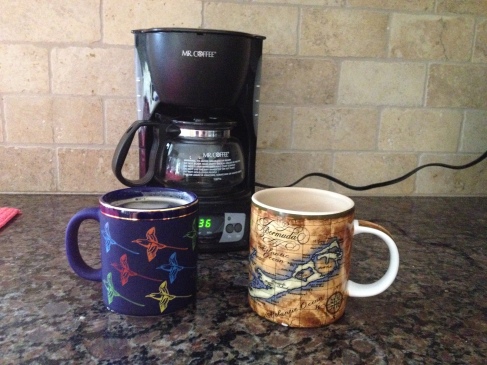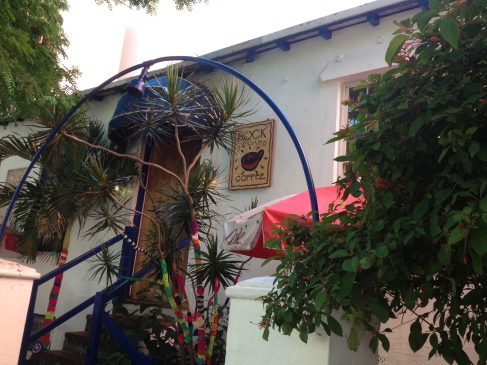When a friend asked to meet for coffee this weekend I was thrown into a mad housework mode: steam-mop the floors, hoover the rugs, polish and dust etc. This friend had helped set us up on the island, passing on to us furniture, kitchen stuff, rugs, TV, dehumidifiers and countless other things so my predominant concern was that she should see we were looking after “her” stuff – that it was ours now faded into the background. I even considered washing the sheets and emptying the dishwasher – no, I do not entertain in the bedroom and this person is nothing like my Mother so she won’t be checking up on my domestic neatness.
I needed to be rational, this degree of stress was way out of proportion to a coffee with a friend. Then the obvious realisation came: we could go out for coffee!
Where?
It just so happened that in the library I found a book entitled “Best Bermuda Coffee, 2010”
(“Coincidence,” said Hermione airily, pouring herself some pumpkin juice. HP and the Prisoner of Azkaban)
What a cushy book to research, 30 coffee outlets, each serving six or so varieties of coffee and repeated visits to check consistency – why didn’t I think of that?!
You might be surprised to learn that there is no Starbucks on Bermuda. Over 20,000 branches, even in Romania, but not Bermuda.
“Our mission: to inspire and nurture the human spirit – one person, one cup and one neighbourhood at a time.” ( http://starbucks.com ) but not in Bermuda.
It is a law that only a local company can trade in Bermuda and by definition a local company has to be majority (>60%) Bermudian-owned and Bermudian-operated. Banks and Insurance companies are subject to different rules – we can look at that in a later post. Also The Prohibited Restaurant Act 1997 forbids the opening of food franchises in Bermuda. How did KFC get in? They were here before the act so subject to a “grandfather clause”.
You can, however, drink coffee bearing a Starbucks label, but I guess this may be a recent development as it is not mentioned anywhere in the book – I did get it out of the library to peruse. The author set out his intention to update his research, but I couldn’t find a more recent edition, maybe he found he preferred tea. The little coffee shop I frequent before the library opens, Chatterbox, is not mentioned in the book so maybe it is a new outlet – it makes nice coffee and serves Starbucks breakfast blend.
Coffee is not grown on Bermuda, it is imported from the large coffee-producing countries, Brazil, Colombia, Ethiopia, mostly via America. In 2010 the most commonly found was Illy, which is 100% Arabica coffee from Italy.
According to the human manual on life (aka wikipedia), three quarters of the world’s coffee is from Coffea arabica with the rest mainly Caffea canephora (previously called robusta ). The latter has a more bitter taste but is resistant to leaf rust, a form of coffee-blight that has devastated crops this year, so we are looking at a price-hike soon.
I have drifted off topic a little, the aim was to find a place to take my friend for coffee tomorrow. She will be in the City of Hamilton – a city by virtue of two cathedrals, but not much larger than a very small town. Confusingly, the city is not in Hamilton Parish, that is further East along the island. So I need to find a place in the city for coffee. Most of the hotels and larger restaurants do coffee but none qualify for the author’s 4-cup accolade, so I focussed on the reviews of the 17 coffee houses.
The first coffee house in Britain was in Queen’s Lane, Oxford, established in 1654, though some sources say it was in Oxford Street, London in 1650 or Lombard Street, London, in 1662.
It was an Oxford Scholar, Nathaniel Canopius, who brewed the first cup of coffee in England in 1641. ( http://canopius.com/who-we-are/our-name/ ) He was a “protosyncellus” of the Constantinople Church and later became Chaplain of Christ Church, Oxford. A coffee house was the birthplace of Lloyds of London – this is a diversion but an interesting one so bear with me …
Edward Lloyd, opened in 1687, a coffee house on Tower Street, London, later moving to Lombard Street as his customer base grew. Not long before this, the King, Charles II, had tried to shut coffee houses down because he felt they brewed rumour and discontent as much as coffee. The Kings edict proved unpopular – he reversed it 16 days later! Anyhow, Lloyd was an entrepreneur of the seventeenth century and he began “Lloyds List” in 1696, a list of ship arrivals and departures and inside information on the conditions on board these vessels. Before long his customers were talking about sinkings and accidents, from there a small step to selling insurance! The whole story can be read in “Against the Gods: The Remarkable Story of Risk” by Peter Bernstein.
It is probably not surprising then that Bermuda has so many coffee houses given one of its main businesses is re/insurance.
Is coffee bad for you?
I could have easily phrased the question “Is coffee good for you?” and the answer can be both “yes” and “no”.
Probably the first experiment on the subject was carried out by Gustav III of Sweden during the 18th century. He used a pair of identical twins who had been convicted of a crime. He commuted the death sentence to life imprisonment with restrictions: one should drink only coffee while the other was given only tea – for the rest of their lives. Two doctors were assigned to monitor the prisoners’ health, but the doctors both died before the experiment ended, as did Gustav III who was assassinated. As it was, the tea-drinker died first.
For the medical readers, caffeine is an adenosine antagonist. Adenosine inhibits dopamine. Caffeine leads to an increase in dopamine in the pre-frontal cortex which leads to higher arousal, faster processing of information and more rapid motor responses. This leads to some reports that caffeine is an antidepressant, but the real picture is far more complex. while it will increase attention, it does not in itself generate pleasure and does not improve memory.
On the benefits side, caffeine is an antioxidant and soaks up free radicals, and you don’t want those running around. It can help with headaches, is a frequent component of analgesics sold over the counter, and recently caffeine has been linked with reducing the risks of prostate cancer, the chance of gallstones and some types of heart failure. But on the other side, it raises blood pressure, is associated with osteoporosis and can contribute to dehydration.
So the jury is out and the pendulum will swing with the vagaries of popular-press-reporting of (mostly) pseudoscientific papers.
I, however, will continue to drink coffee.
And we still haven’t decided on where to go for coffee tomorrow.
Of the places reviewed, one is described as “the ultimate coffee house in Bermuda” . I feel I should insert a drum roll here. …
Rock Island
For fifteen years this company has roasted coffee beans on site – which is why it smells so good – and they offer home-style baking such things as Courgette Cake and Lemon Cookies. The furniture is, well, unusual – none of it matches, most of it is old, but I have tried two different seats and both were decently comfortable. The artwork is more interesting than most of what is on the portrait gallery and for people-watching it is a wonderful place.
The coffee is 100% Arabica and offered in the usual variations – espresso, machiato, latte, cappuccino and americano. They even knew what to do when I asked for a plain black coffee. I don’t suggest you ask for tea though, as they really do focus on coffee.
It’s on Reid Street, by the way with on the street parking immediately outside which gives you an hour for $2. If intending on a larger cup you might like to park at Cavendish Road and walk down or City Hall and walk up. City Hall, although more central to the shops is actually a little cheaper, but still limited to three hours.
So that is my decision made.
Coffee, tomorrow, at Rock Island Cafe, around 2.30. 🙂


